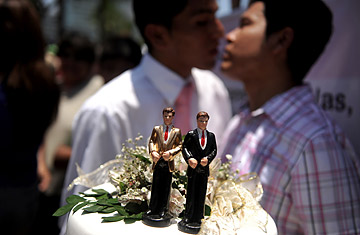
A gay couple kisses during a fake gay wedding at Love Park in Lima on Feb. 14, 2010
A quick trip through Peru's capital, Lima, or any of the country's principal tourist destinations might easily mislead visitors into thinking that this Andean nation is a mecca of gay culture. The confusion comes from ubiquitous rainbow flags that fly atop public buildings and are hawked widely by souvenir vendors. But the flag is not exactly identical to the one that has become synonymous with the gay and lesbian rights movement around the world. The Peruvian version is much older — supposedly with origins during the Inca Empire. It also has one extra stripe that is either light blue or white.
And that mirage is also dispelled by the facts on the ground. In run-up to the April 10 presidential elections, the very suggestion of legalizing same-sex unions has further muddied an already dirty race.
Presidential front-runner Alejandro Toledo, trying to win back the office he held between 2001 and '06, got things going after his party announced that it supported civil unions for same-sex couples. "We are not promoting gay marriage, but we are fully behind civil unions," said Toledo.
Toledo's embrace of civil unions has turned a nonissue for most Peruvians into one of the hottest topics of the campaign. The 13 parties in the race have staked out positions, as have President Alan García, who is barred from running for a consecutive five-year term, and the Catholic Church.
The principal candidates have taken qualified approaches, with some saying they agreed with Toledo as long as civil unions do not give homosexuals the right to adopt children, while others have said it is an interesting idea that should be looked at among other antidiscrimination policies.
One small party, Fuerza Social, has taken the idea a step further and called for gay marriage. But the proposal has not gotten much attention because the party's candidate has yet to poll above 1% in national surveys. Lima Mayor Susana Villarán, also of Fuerza Social, upped the bar a little by declaring on Feb. 14, Valentine's Day, that she was considering a municipal ordinance allowing same-sex unions. She presided over a "kiss-in" of gay couples on that day.
By and large, however, Peruvians are not sold on the idea. An early February survey found that 69.5% of Peruvians polled disapprove of same-sex unions, while 74.7% oppose same-sex marriage. And there is no ambiguity in the influential Catholic Church, with even prelates of a supposedly liberal bent taking a strident stand. Retired Bishop Luis Bambarén, generally considered an ally of minorities, said he was tired of all the talk about gays. At one point, he said the media should not be using the word gay, but maricón, a slur. Bambarén later apologized.
Toledo's vice-presidential candidate, Congressman Carlos Bruce, said there was no need to respond to Bambarén. "We understand people who are opposed [to civil unions], but we can only respond to rational arguments. These comments are not rational," he said. Bruce is the author of a bill in Congress that would authorize couples, heterosexual or homosexual, to establish unions similar to corporations in order to share assets, get joint loans and transfer benefits, like social security.
The rest of the bishops released a public statement saying marriage was not only between a man and a woman, but also "indissoluble," which would seemingly bring into question the country's liberal divorce laws that have been used by all elected Presidents since the 1960s to end their own marriages. President García took a philosophical approach, saying the word marriage can be traced back to the Latin root for mother, so if there is no mother involved in the union, a different word should be used.
Peru, however, would not the first country in the region with civil unions or gay marriage. Argentina approved gay marriage last year and Colombia and Uruguay have different versions of civil-union laws in place. Mexico City recognizes gay marriage, but the country as a whole does not. Peru is, however, the first country where the question has stirred up a controversy that could help define who becomes the next President.
